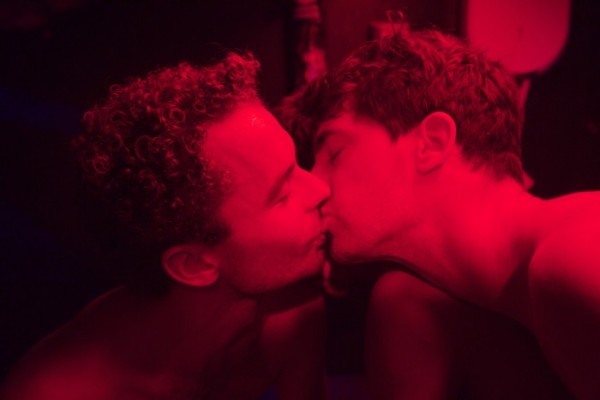
Courtesy of Ecce Films, Epicentre Films
Our coverage of the 2016 Inside Out LGBT Film Festival begins with Paris 05:59: Theo & Hugo, a sweet “meet cute” romance that dispenses with the sexual tension and titillation early on in order to focus on the real drama of a burgeoning relationship.
Let’s bitch it out…
Paris 05:59: Theo & Hugo (Theo et Hugo dans le meme bateau) is a French film from co-directors Olivier Ducastel and Jacques Martineau about two young men Theo (François Nambot) and Hugo (Geoffrey Couët). In the opening scenes of the film, the men meet very late (or very early) one night at Inferno, a gay sex club in Paris. Bathed in nationalistic blue and red light, with a pounding techno soundtrack, Theo can’t tear his eyes away from Hugo, whom he sees across the room. Despite advances from other men, Theo maneuvers himself into a position to engage Hugo in a sexual encounter and the two make love in an isolated spotlight, surrounded by men who lurk in the shadows and the outskirts; directors Ducastel and Martineau shoot the lovemaking to capture the sense that the rest of the world has fallen away while simultaneously acknowledging the inherent voyeurism that the bathhouse (and the audience’s viewing experience) provides.
The roughly 18 minute opening scene set at Club Inferno will undoubtedly be a litmus test to sensitive audiences. It reminded me of other similarly confronting opening sequences in Moulin Rouge and Saving Private Ryan – films that use their first few minutes to communicate tone and intention in a way that practically dares audiences to leave if they’re not comfortable. Paris 05:59: Theo & Hugo, however, refuses to ignore the realities of attraction: full frontal male nudity and sex acts are fair game, but squeamish audience members who survive the opening can take solace in the fact that the encounter sets the stage for romance as the men spend the rest of the film getting to know each other before the sun rises at 6am.
The sex scenes are undeniably provoking, sexy and voyeuristic, but they also serve a purpose. It’s not until Theo and Hugo exit the club that they realize the implications of their bout of unprotected sex: Hugo is HIV+ and Theo is now at risk of contracting the virus. Thus begins a series of adventures: to the emergency room, to a Kebab shop, to the deserted Paris canals and finally to the first train of the morning. Along the way the boys wander around like nomads, learning each other’s history, bickering, and encountering a wide swath of Parisian society and political issues including homophobia, Syrian conflict, and working conditions for old-age pensioners.
Paris 05:59: Theo & Hugo is evocative of Andrew Haigh’s break through festival film Weekend, which similarly focused on a pair of new lovers in real time over a short period of time. Like that film, Paris o5:59 relies heavily on the chemistry between its leads and in this respect Nambot and Couët deliver compelling, naturalistic performances that makes it easy to understand why Theo and Hugo were attracted to each other and why they stay together when things become less than ideal. At times the issues raised by the various characters Theo and Hugo interact with feel a little shoe-horned and/or preachy, but the meandering nature of the all-in-one-night narrative lends itself to episodic encounters that arise and then dissipate just as quickly, leaving the leads to seek out new environments and adventures.
Throughout it all, Ducastel and Martineau’s direction is impressively understated. The film is never more stylized than the opening scenes at Inferno (particularly the extended love scene), but after Theo and Hugo emerge from the cave-like club to the abandoned streets of Paris, the streetlamp lighting and long takes create a sense of romance and intimacy. There’s even a hint of guerrilla filmmaking when the boys catch the first train of the morning and it’s unclear if the other riders are actors or bystanders caught on film, a minor background episode that adds an amusing touch of verisimilitude to the proceedings.
Bottom Line: Paris 05:59: Theo & Hugo is a naturalistic real-time romance that rewards audiences with intimacy and a sweet character-driven romance so long as squeamish moviegoers can enjoy/endure the opening hardcore sex sequence. Definitely worth a look.
Check back Wednesday for a mini-review of the new Ira Sachs film, Little Men (screening that night at 9:45pm at TIFF Bell Lightbox)